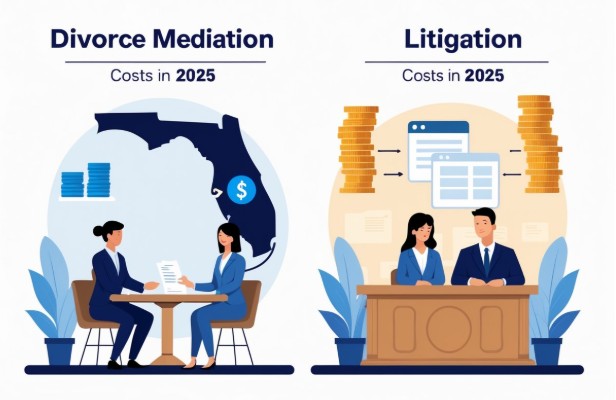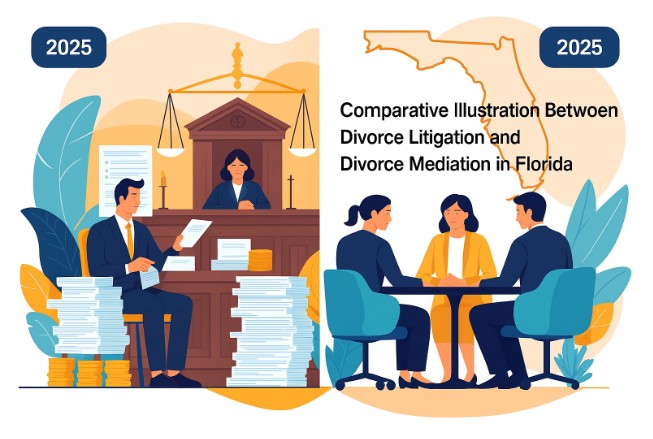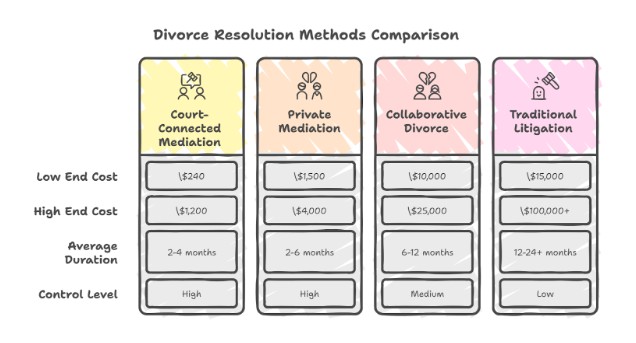

We now offer Virtual Mediations using Enhanced Video Conferencing
Originally published: August 2025

Many couples facing divorce in Florida worry about the cost of the process. The choice between mediation and litigation can make a significant difference, both emotionally and financially.
Mediation usually costs significantly less than litigation because it proceeds more quickly, involves fewer court appearances, and avoids the drawn-out legal battles that can occur in litigation.
Understanding the real cost difference helps people make better choices for their situation.
By comparing divorce mediation and litigation costs in Florida for 2025, individuals considering divorce can determine which option best suits their needs and budget.
The right path can impact not only your bank account but also your peace of mind. Exploring both options gives families the knowledge to pick what works for them during a stressful time.

Traditional divorce litigation in Florida often results in significantly higher costs compared to other options. Legal fees, court expenses, and surprise charges pile up fast, especially as cases drag on for months—or even years.
Hiring an attorney for divorce litigation is typically the most significant expense for Floridians. Most family law attorneys charge by the hour, and in 2025, rates usually range from $250 to $500 per hour.
Legal battles consume hours with case preparation, paperwork, negotiations, and court appearances. It’s not unusual for each spouse to spend $10,000 to $30,000 or more just on lawyers.
For high-conflict cases, costs escalate even further if both sides dispute child custody, alimony, or property division.
Long court fights result in additional charges for paralegals, researchers, and expert witnesses. When estates or businesses get involved, the bill can soar well above average.
Divorce litigation in Florida means mandatory court filing fees. In 2025, the filing fee sits around $400 to $450 per case.
Each motion, hearing, or request incurs additional costs—ranging from $50 to several hundred dollars each. If documents need to be delivered, the sheriff’s office charges fees, and there are additional costs for notaries or certified copies.
Some cases require numerous hearings, which increases court costs. Court reporters may be necessary for official transcripts, particularly in contested or complex cases.
All of these charges come due whether or not you reach an agreement before trial.
Many couples don’t expect the secondary costs that grow during litigation. Missed work for court or meetings with a lawyer can hurt your income.
Expert fees add up too—property appraisers, child psychologists, or forensic accountants often charge hundreds per hour. Other out-of-pocket expenses also arise, such as travel, parking, and childcare on court days.
The stress and length of the process can take a toll on your health, both mentally and physically. Those costs aren’t easy to measure, but they’re real.
By 2025, the total cost of a fully litigated divorce in Florida will usually land between $13,000 and $30,000 per spouse. Simple contested divorces may be on the lower end, but most run about $20,000 when significant issues are at stake.
If things become particularly heated or complicated—such as involving significant assets or custody disputes—the total can exceed $50,000 per spouse. In rare cases with appeals or drawn-out trials, people have paid well over $100,000.
Mediation gives families more control, lower fees, and a genuine opportunity to reach fair agreements. People value privacy and a less stressful atmosphere compared to litigation.
Florida courts run a special mediation program for divorce. This program typically begins early in the process and sets fees based on family income, making it affordable for many.
Families earning under $50,000 might pay $60 an hour, while those with higher incomes could pay up to $120 an hour.
Mediation often takes place at the courthouse or online, with a neutral mediator guiding both sides toward a mutually agreeable solution.
Sessions are scheduled quickly, so disputes are often resolved faster than waiting for court. This route can save you a significant amount of money compared to a full trial. Couples who need extra structure but want to avoid expensive court battles tend to prefer this option.
Private mediation happens outside the court system. Couples typically select their mediator, who is often a lawyer or retired judge.
Fees for private mediation in Florida usually run from $200 to $500 per hour, depending on the mediator’s background. Some mediators offer flat fee packages for simple cases.
Scheduling is more flexible, and the environment feels less formal than in a court setting. Sessions might last a few hours or a whole day, depending on what’s at stake.
Private mediation is well-suited for couples with complex assets, business interests, or unique parenting situations.
People appreciate being able to negotiate at their own pace, in private, with more say over the outcome.
Some couples enlist the help of additional professionals, such as financial advisors or mental health specialists. These experts charge separately, typically ranging from $100 to $400 per hour.
Financial experts assist individuals in managing their pensions, investments, and real estate. Parenting coordinators or therapists can support families with special needs or high conflict. These costs are optional, but they can sometimes facilitate smoother negotiations.
By picking only the services they need, families can manage costs and get expert help where it matters. This flexibility enables couples to foster stronger, more enduring relationships.
Start your divorce process the smarter way with Ann Goade’s cost-conscious divorce mediation services designed for Florida families—schedule a confidential consultation today.
If you’re ready to get started, call us now!
Collaborative divorce brings a team of experts to the table to help couples reach mutually agreed-upon agreements. This team-driven approach results in higher costs compared to other options.
The structure and cost of collaborative divorce differ significantly from those of mediation, especially in Florida.
Collaborative divorce uses a team that usually includes each spouse’s attorney, a neutral financial expert, and a mental health professional.
Sometimes, child specialists or other experts join the team if needed. Each member charges their fees.
Lawyers often charge $250 to $500 per hour, while financial and mental health experts typically bill $100 to $300 per hour.
With several professionals on board, costs add up fast. Here’s a quick breakdown of common team members and typical fees in Florida:
| Team Member | Typical Hourly Rate |
| Attorney | $250–$500 |
| Financial Neutral | $150–$300 |
| Mental Health Expert | $100–$300 |
There may also be charges for meetings, document preparation, and additional consulting specialists. For a full case, total costs often reach $15,000–$50,000 or more for both spouses combined.
Mediation typically involves a single, trained neutral mediator helping both sides reach a mutually agreed-upon agreement. This process costs much less than collaborative divorce, since there’s no team and fewer billable hours overall.
In Florida, a mediator’s hourly rate typically ranges from $100 to $400. Most mediation cases are resolved in a few sessions, with total costs ranging from $ 250 to $7,500 for many couples.
Unlike collaborative divorce, mediation doesn’t require a whole team of professionals. For families with simpler finances or who agree on most issues, this keeps costs down compared to the team-based approach.
Couples should ask themselves if the extra support is worth the higher price tag compared to the simpler—and usually less expensive—path of divorce mediation in Florida.

Divorce mediation and litigation in Florida have distinct differences in terms of costs, duration, and outcomes. Comparing these options visually helps people spot not only the average amount spent, but also the time saved and potential long-term benefits.
A table makes it easier to identify the key differences between divorce mediation and litigation in Florida for 2025.
| Divorce Method | Low End | High End | Average Duration | Control Level |
| Court-Connected Mediation | $240 | $1,200 | 2-4 months | High |
| Private Mediation | $1,500 | $4,000 | 2-6 months | High |
| Collaborative Divorce | $10,000 | $25,000 | 6-12 months | Medium |
| Traditional Litigation | $15,000 | $100,000+ | 12-24+ months | Low |
Mediation usually saves Florida families both time and money. Litigation drags things out, piles on legal fees, and often ramps up the stress.
With a break-even approach, families can see when the extra cost of litigation just isn’t worth it.
To figure this out, use a pretty simple formula:
If the only reason to pursue litigation is the hope of a larger settlement, that expected gain must be greater than the additional cost.
So, say mediation costs $6,000 and litigation is $20,000. That’s a $14,000 difference—unless you think you’ll receive significantly more than that in return, mediation is usually the smarter financial choice.
Running this calculation gives you a real number to work with. It keeps the focus on actual dollars, not just hunches or wishful thinking.
Return on Investment (ROI) helps measure the value of choosing mediation over litigation. It considers both short-term costs and the broader perspective.
Here’s the formula:
ROI = (Litigation Cost – Mediation Cost) / Mediation Cost × 100
If mediation costs $5,000 and litigation costs $25,000, you’re looking at a 400% ROI. That’s four times less expensive.
But it’s not just about the money. A higher ROI with mediation can mean faster closure, less stress, and smoother co-parenting. The benefits can last long after the divorce, giving families a head start on moving forward.
If you’re weighing your legal options, Ann Goade offers clear and affordable virtual family mediation sessions tailored to your specific situation—reach out to discuss your next steps.
If you’re ready to get started, call us now!
Divorce costs in Florida can swing wildly. It really depends on how complicated the finances are, how well the couple communicates, and whether they choose mediation or litigation.
Some issues almost always drive up the bill:
If people can’t agree, lawyers spend more hours prepping paperwork and appearing in court. Litigation nearly always costs more than mediation.
Costs keep adding up from:
The longer the case drags on, the bigger the final bill due to:
You can take steps to reduce costs. Mediation, rather than a court, is usually the most cost-effective way to resolve disputes.
In mediation, a neutral third party helps both sides find common ground, trimming legal fees.
Getting your financial documents organized early also helps a lot. When both sides share clear, complete records, things move faster, and you avoid doing the same work twice.
Good communication matters—focusing on practical solutions instead of letting emotions run wild usually leads to better outcomes.
Some people save by hiring lawyers only for specific tasks—such as reviewing an agreement—instead of full representation throughout the entire process.
Sometimes, you have to switch gears between mediation and litigation. If mediation isn’t yielding fair results or if someone is withholding information, heading to court may be the only option.
If the conflict is just about one issue, you might handle most of it in mediation and then let a judge decide the last piece. This “hybrid approach” can cut costs.
However, if there’s a power imbalance or someone is being pushed into making decisions, litigation offers more protection. The best choice really depends on the details and what each person needs.
Divorce costs in Florida depend a lot on where you live and what state law requires. Local court fees and unique state rules can affect both mediation and litigation expenses.
Florida is comprised of many counties, and each one sets its court fees. For example, filing fees in places like Miami-Dade or Broward can exceed $400, while those in rural counties tend to be more affordable.
Living in a city usually means higher attorney fees and service costs, simply because demand and living expenses run higher.
Wait times for hearings and court backlogs also play a part—if you’re in a crowded county, the divorce may drag on, raising costs.
Some counties offer more mediation services or special family law programs, which can help lower costs if you use them early.
Florida law influences divorce costs, particularly regarding mediation and litigation. Courts here often require couples to try mediation before opening a contested case.
This helps lower court costs for many families, as mediation can resolve issues more quickly than a full trial.
Other legal rules—such as those regarding alimony, child support, and property division—can increase costs if parties cannot agree. When couples can’t settle things themselves, court involvement almost always raises the price.
Florida law also outlines the documents that must be filed and the level of detail required, which means more legal assistance is needed for complex cases.
Picking between divorce mediation and litigation in Florida isn’t just about money—both emotional needs and financial limits matter. People need clear steps to sort through choices and spot warning signs early on.
A decision matrix helps couples or individuals weigh the two main divorce routes. You can list factors such as cost, time, privacy, stress level, and the level of control you maintain.
| Factor | Mediation | Litigation |
| Average Cost | Lower | Higher |
| Time Involved | Usually shorter | Often longer |
| Privacy | More private | Public record |
| Control | More flexible outcomes | Judge decides |
| Stress Level | MIt maybe less stressful | Can be higher |
People should rate how much each factor matters and then compare the options. If privacy and speed are your top priorities, mediation is a better fit.
But if there’s zero agreement, litigation might be necessary—even if it brings more stress and cost.
Red flags help people spot when a method just won’t work. In mediation, watch out for abuse, someone hiding money, or a refusal to talk honestly. Mediation only works if there’s some trust and willingness to negotiate.
Litigation’s biggest risk is runaway, unpredictable costs. Long court fights mean more stress and drained resources—both financial and emotional. If the court process feels overwhelming or every little thing turns into a battle, litigation might not be the best route.
Being honest about personal needs and limits helps guide the decision.
If you’re facing divorce in Florida, you might need to get creative with how you pay for it. It’s also worth knowing how your choices could affect taxes during or after the process.
Most people dip into personal savings or joint marital funds to pay attorney or mediator fees. Credit cards and personal loans are common too, but they can leave you with debt long after the divorce wraps up.
Some folks borrow from friends or family. That route sometimes stirs up tension, though, so it’s not for everyone.
If you’ve got a tight budget, you might look into legal aid or see if a law firm offers payment plans. Sometimes, if there’s a big gap in income or assets, a judge might order one spouse to cover the other’s legal costs.
It’s smart to keep detailed records of your spending, especially when you share accounts. Tracking the costs helps both parties see where the money is going during the divorce.
How you pay for divorce can affect your taxes. If you pull money from retirement accounts like a 401(k) or IRA, you’ll probably face early withdrawal penalties—and that cash gets taxed as income.
Consulting a financial advisor before utilizing retirement funds is advisable. Attorney fees for divorce aren’t usually tax-deductible, but legal fees tied to getting taxable alimony might get treated differently in certain cases.
Once the divorce is final, things like tax filing status, who claims dependents, and possible alimony payments all impact your yearly tax return. It’s worth sitting down with a tax professional to sort out the details and avoid any unpleasant surprises.
Many couples in Florida face difficult decisions when considering divorce. Mediation and litigation each bring their own financial and emotional costs.
Mediation typically allows both sides to discuss their concerns in private. It’s often less expensive and wraps up faster.
Sometimes, though, litigation feels unavoidable—especially when there’s serious conflict or complicated issues. It tends to be more expensive, and the process can be prolonged.
Court battles? They can drain your time and wallet. Nobody enjoys that, but sometimes it’s the only way forward.
Couples should weigh their own needs and goals. Picking the right approach can lower stress and help you see a way forward, even if it’s not easy.
Don’t let court costs and delays define your future. Discover how Ann Goade’s Florida divorce mediation approach helps couples move forward faster—contact us to get started.
What is the average cost of divorce mediation in Florida?
The average cost of private divorce mediation in Florida ranges from $1,500 to $4,000, depending on the mediator’s hourly rate, session length, and complexity of the case.
How much does a contested divorce cost in Florida?
A contested divorce in Florida typically costs between $15,000 and $50,000 or more, depending on attorney fees, court expenses, expert witnesses, and the complexity of the case. High-conflict or asset-heavy divorces can exceed $100,000.
Is mediation always cheaper than litigation in Florida?
Yes, mediation is almost always cheaper than litigation in Florida. Mediation avoids drawn-out court battles, reduces attorney hours, and offers faster resolutions, making it more cost-effective for most families.
How long does divorce mediation take in Florida?
Divorce mediation in Florida generally takes 2 to 6 months, depending on the number of sessions required and the parties’ willingness to negotiate. In contrast, litigation often lasts 12 to 24 months or more.
What factors increase the cost of a Florida divorce?
Key cost drivers include child custody disputes, business ownership, high-conflict communication, hidden assets, and extended discovery. Attorney fees and delays from court congestion can also escalate total expenses.
Can you switch from mediation to litigation in the state of Florida?
Yes. If mediation fails or one party is uncooperative, either spouse can transition to litigation. However, switching methods mid-process can increase costs and prolong the divorce timeline.